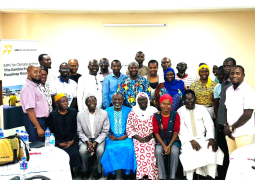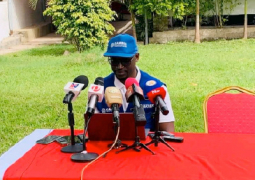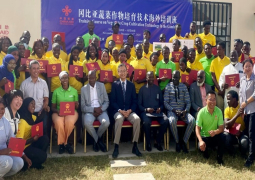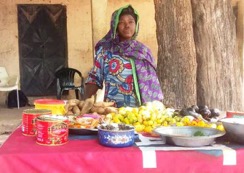
The ‘Nafa’ Program component of The Gambia Social Safety Net Project (SSNP) (a US$ 31 million project) is jointly funded by the World Bank and the Government of The Gambia. The ‘Nafa’ Program is designed to promote continuity and harmonisation with other programs, by expanding an existing package of cash transfers with Social and Behavioural Change Communication (SBCC) managed by NaNA and partners.
The National Nutrition Agency (NaNA), Directorate of Social Welfare and Department of Community Development are the implementing partners of the ‘Nafa’ Program.The Gambia SSNP is implemented in West Coast (WCR), Central River (CRR), North Bank (NBR), Lover River (LRR) and Upper River Regions (URR) targeting 15,606 extremely poor households. This equates to approximately 40 percent of the extremely poor households in The Gambia. For a start, it was piloted in Foni Bintang, Nainija and Wuli West Districts.
The Project Development Objective (PDO) is to improve the coordination of social assistance activities, provide temporary social assistance support to rural households in the wake of COVID-19, and increase inclusion of the extreme poor in the ‘Nafa’ Program.
The beneficiary selection was done using a Proxy-Means Test (PMT) which was followed by a community validation exercise in the poorest 20 districts of The Gambia. The regular revenue provided to extremely poor households is aimed at increasing short-term consumption of essential goods and enabling longer-term investments in human and productive capital.
Tailored SBCC provides information to beneficiaries and non-beneficiaries to encourage investments that can bolster human capital especially maternal and child health and nutrition, adolescence education and family planning; parenting and prevention of gender-based violence; and productive capital especially savings, entrepreneurship and agriculture to break the inter-generational cycle of poverty. In the three piloted districts and the expansion, a total of over Fourteen thousand beneficiary households each received D3000 every two months during the three rounds of payment.
Nabanding as she is widely called said she was into the business prior to benefiting from the project but the Cash Transfer enhanced her business.
“I used to take vegetables on loan/credit basis from vendors and pay back after selling my vegetables but now I buy directly from gardens after benefiting for the ‘Nafa’ Program,” she stated. “The ‘Nafa’ Project improved my living condition and livelihood,” she also said.
She pointed out that, she has also bought two small ruminants from the project. She said the initiatives are aimed at sustaining herself and her household when the project ends.
She advised her fellow beneficiaries to save part of their money or invest into something that can generate profit to be able to sustain themselves when the project ends.
She thanked the World Bank and The Gambia Government for funding the project. She also thanked implementing partners.
Samba Bah, Governor of Upper River Region expressed satisfaction with the way the Cash Transfer is carried out by implementing partners, saying this is because an assessment was done to identify extremely poor households.
He observed that the Cash Transfer has positively impacted the lives and livelihoods of beneficiaries.
He pointed out that beneficiaries do not only stop at receiving the money but are putting it into good use with some of them investing in businesses and other ventures.
Governor Bah noted that the project has transformed the lives of many in his region and other parts of the country and therefore appeal to the World Bank and The Gambia Government to expand it to other districts across the country and increase the duration and scope of the project so that the poverty alleviation the country is yearning for is achieved.
Abdou Aziz Ceesay, Director of Social and Behavioral Change Communication at the National Nutrition Agency said as a nutrition agency responsible for all nutrition and nutrition-related activities in the country, the success registered by the project is a dream come true for them.
He highlighted that, if you uplift the extremely poor from poverty, it improves under-nutrition, adding that lifting households from poverty and building their resilience improves their health and nutritional status as well.
Mr. Ceesay pointed out that if the trend of success registered by beneficiaries continues we will drastically reduce malnutrition and contribute to socio-economic development of the country.
He said, the reason why the cash transfer is accompanied with Social and Behavioral Change Communication is to ensure beneficiaries invest part of the money they receive to ensure they are able to sustain themselves at the end of the project and ultimately to reduce under nutrition.
He called on other beneficiaries to emulate those that are already successful or have started micro-finance businesses.
Read Other Articles In National News
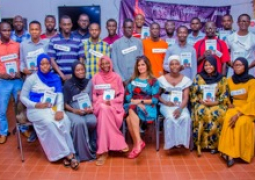
Breaking the silence: Binti celebrates Menstrual Health Day in Gambia
Jun 3, 2024, 11:36 AM
